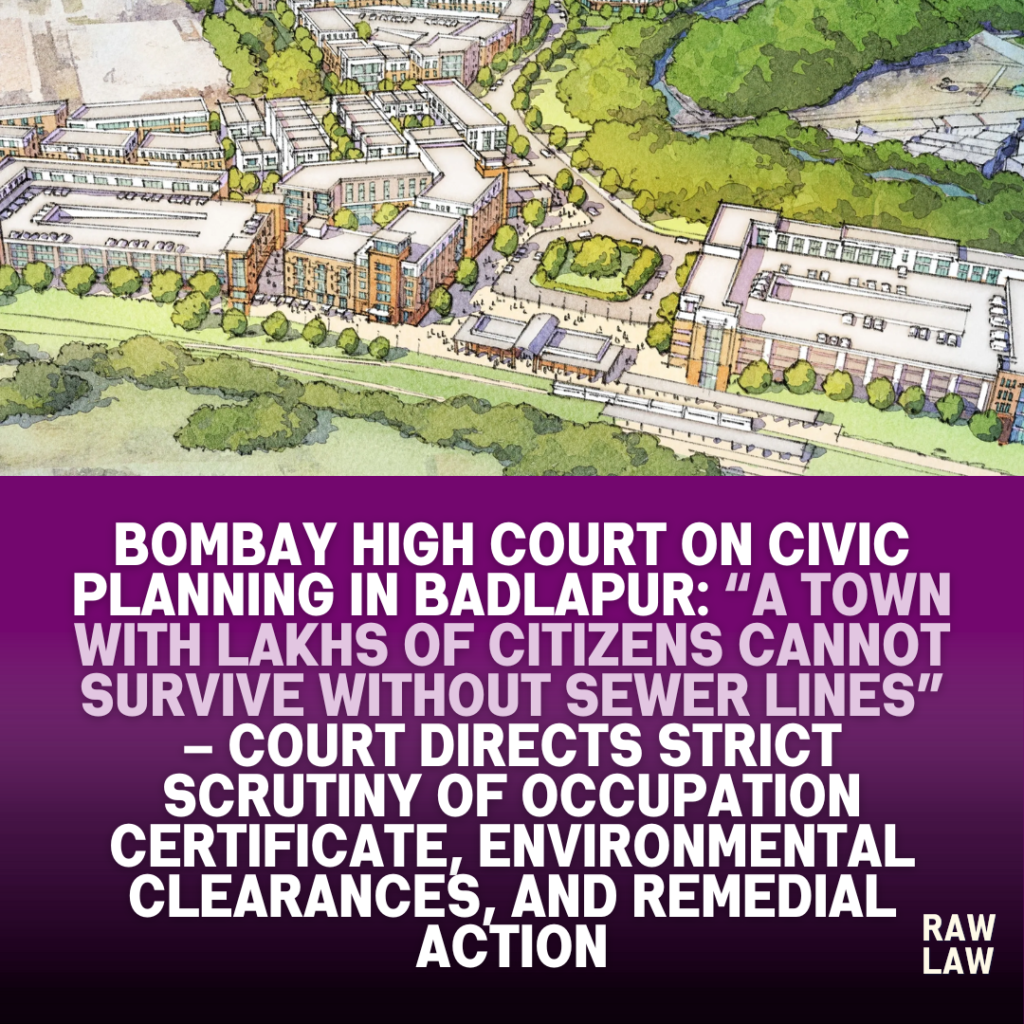Court’s Decision
The Bombay High Court came down heavily on the Kulgaon-Badlapur Municipal Council (KBMC), holding that permitting large-scale construction without proper sewage lines or treatment facilities amounted to a “gross abuse of environmental laws” and a denial of citizens’ fundamental right to a clean environment. The Court stressed that “it shocks the conscience of the Court that a large city with lakhs of people has no sewerage line or treatment plant, and all waste is discharged into the Ulhas River.”
The Court ordered strict remedial measures, including scrutiny of the Occupation Certificate, corrective action against the developer, municipal officers, and society office bearers, and a comprehensive plan for sewage treatment in the region.
Facts
The petitioner, an agriculturist, complained that his farmland had been rendered unfit for cultivation due to untreated sewage from a large residential project, “Skyline/Trishul Golden Ville,” built by the developer. The project housed more than 440 flats but was connected only to a small, insufficient septic tank. Overflowing sewage polluted the petitioner’s land and ultimately drained into the Ulhas River.
Despite repeated complaints, the municipal council failed to act, and even granted the developer an Occupation Certificate without ensuring compliance with sewage norms. Expert reports confirmed contamination, lack of sewer infrastructure, and the possibility of environmental clearance (EC) violations, as the project area could exceed 20,000 sq. m.
Issues
- Whether the KBMC and developer acted illegally in constructing and occupying the building without a functioning sewage system.
- Whether the Occupation Certificate granted without sewage infrastructure was valid.
- Whether environmental clearance was mandatory for the project.
- Whether untreated sewage discharge violated statutory environmental laws and citizens’ rights.
Petitioner’s Arguments
The petitioner argued that his agricultural rights under Article 300A and his fundamental rights under Articles 14 and 21 were violated. He emphasized that untreated sewage polluted his land, rendering it unusable. He submitted that the Occupation Certificate was illegally issued without verifying sewage connections and sought damages of ₹10 lakhs for loss and nuisance.
Respondent’s Arguments
The developer contended that the municipal council had undertaken sewage works and that the grievance would soon be resolved. The municipal authorities attempted to justify their inaction by citing ongoing infrastructure projects. However, reports and photographs relied upon by the respondents failed to show any functional sewage system in place.
Analysis of the Law
The Court analyzed the Water (Prevention and Control of Pollution) Act, 1974, the Environment Protection Act, 1986, and the UDCPR rules, holding that untreated sewage discharge was in blatant violation of these statutes.
The Court emphasized the public trust doctrine, observing that municipal authorities are trustees of public resources and cannot permit pollution of rivers or degradation of ecology. Granting an Occupation Certificate without sewer lines was termed a “dereliction of duty.”
Precedent Analysis
The Court referred to Supertech Ltd. v. Emerald Court Owner Resident Welfare Association (2021) 10 SCC 1, where the Supreme Court held that every stage of construction, from planning to occupation, must comply with statutory norms, including sewage and environmental safeguards. The Bombay High Court applied this precedent to stress that developers and municipal bodies cannot ignore environmental and civic requirements.
Court’s Reasoning
The Court found that:
- The septic tank built by the developer was grossly inadequate and poorly constructed.
- KBMC issued Occupation Certificates without verifying sewage compliance, showing a “shocking disregard of civic duties.”
- Expert reports confirmed untreated sewage was draining onto the petitioner’s land and into the Ulhas River.
- Environmental clearance was likely required but was never obtained.
The Court held that both the developer and municipal officials were responsible, and the matter was not limited to the petitioner but affected lakhs of citizens in Badlapur.
Conclusion
The High Court concluded that the construction and occupation were illegal and environmentally unsustainable. It directed:
- Corrective action by KBMC, developer, and society office bearers to stop sewage discharge.
- Scrutiny of Occupation Certificates and accountability of officers who issued them.
- Thane Collector to oversee implementation and report compliance.
- Maharashtra Pollution Control Board to act against illegal sewage discharge.
Implications
This judgment reaffirms the principle that urban development cannot come at the cost of environment and public health. Municipal councils must ensure sewage infrastructure before granting building permissions. Developers cannot escape liability by shifting blame to civic bodies. The ruling sets a precedent for stricter judicial scrutiny of construction projects across Maharashtra.
Cases Referred
- Supertech Ltd. v. Emerald Court Owner Resident Welfare Association (2021) 10 SCC 1: Emphasized regulatory compliance in all stages of construction, including sewage and environmental safeguards. Applied here to underline illegality of KBMC and developer’s actions.
FAQs
Q1. What did the Bombay High Court say about the absence of sewage lines in Badlapur?
The Court observed that “a large city not having a sewerage line or treatment plant, and discharging sewage into a river, shocks the conscience of the Court.” It held this was a gross abuse of environmental laws.
Q2. Why was the Occupation Certificate questioned by the Court?
Because it was issued without verifying basic sewage infrastructure. The Court found this to be a serious dereliction of duty and ordered accountability of the municipal officers.
Q3. What is the significance of this judgment?
It highlights that urban development must prioritize environmental safeguards, sets accountability for municipal bodies and developers, and protects citizens’ right to a clean and healthy environment.



